Photo caption
From left: Managing Director, Shell Nigeria Gas Limited, Mr. Ralph Gbobo; Managing Director of the Shell Petroleum Development Company Limited and Country Chair of Shell Companies in Nigeria, Mr. Osagie Okunbor; and Managing Director of Shell Nigeria Exploration and Production Company, Mrs Elohor Aiboni.
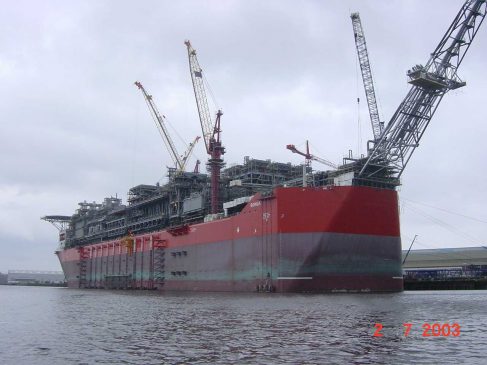
Photo caption: Bonga FPSO
Shell means different things to different Nigerians. To some, the oil giant is a messiah God sent to Nigeria to keep it from sinking, and yet to others, it is a company that takes the people’s God-given wealth and leaves the environment devastated. Nevertheless, irrespective of the prism through which one sees Shell, it has been a dependable partner to Nigeria over the years. Shell has positively touched key sectors of the economy in sustainable ways, which gives it a pride of place in Nigeria and tops of its contemporaries in Africa’s most populous country, EMEKA UGWUANYI reports.
In its over 60 years of oil exploration and production business in Nigeria, Shell has shown unwavering commitment to its host country – Nigeria, despite enormous challenges bordering on operating environment, insecurity and unsteady policies, especially in recent times.
Shell operates under three major companies in Nigeria known as Shell Companies in Nigeria (SCiN) – Shell Petroleum Development Company of Nigeria Limited (SPDC), Shell Nigeria Exploration and Production Company Limited (SNEPCo) and Shell Nigeria Gas Limited (SNG Ltd.)
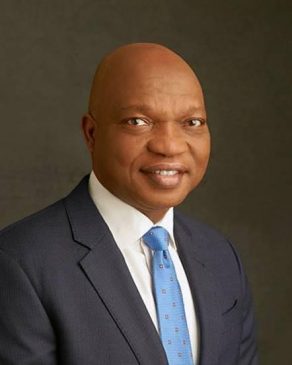
*Osagie Okunbor
The Shell Petroleum Development Company of Nigeria Limited (SPDC) is the pioneer and leader of the petroleum industry in Nigeria. SPDC is the operator of the NNPC/SPDC/Total Energies/NAOC Joint Venture and supplies onshore and shallow water oil and gas to domestic and export market from its operations in the Niger Delta.
Shell Nigeria Exploration and Production Company Limited (SNEPCo) pioneered deep-water oil and gas production from the Bonga field in the Gulf of Guinea in water depths of more than 1,000 metres. When Bonga began production in 2005, it increased Nigeria’s oil production capacity by 10 per cent. Currently, substantial volume of crude oil production comes from the Bonga and Erha fields. Erha oil field in oil mining lease (OML) 133 is operated by Esso where Shell has 43.75 per cent interest.
Shell Nigeria Gas Limited is a fully owned Shell company incorporated in 1998 for the downstream distribution of gas to industries in Nigeria. SNG is part of the Shell Energy business line in Nigeria which covers gas, power, renewables and energy solutions for industrial and commercial customers. SNG’s mission is to provide its customers with a clean, reliable, low-cost alternative to liquid fuel, and to assist in building a stronger Nigerian economy. SNG currently operates a growing world class gas transmission and distribution network of over 138km across the country.
Of all the oil companies in Nigeria – majors and independents, Shell has demonstrated appreciable transparency, accountability and inclusiveness in its operations. It is the only company in Nigeria’s petroleum industry that puts its transactions and payments to the government in the public space. This is aside its commitment to corporate social responsibilities.
As one of the world’s leading oil majors, Shell was the first and only oil major that built a refinery in Nigeria, which is currently owned by the Federal Government. Ever since the refinery was handed over to the government, it has continued to decline due to lack of maintenance and presently doesn’t refine.
At the peak of gas flaring in Nigeria, Shell initiated and spearheaded the establishment of the Nigeria Liquefied Natural Gas Limited (NLNG). Today, NLNG is a huge success story and is currently working on its Train 7 construction. On completion, Train 7 will increase production capacity of NLNG’s plant on Bonny Island, Finima, Rivers State from 22 million metric tonnes to 30 million metric tonnes per annum and create over 12,000 direct jobs during construction phase.
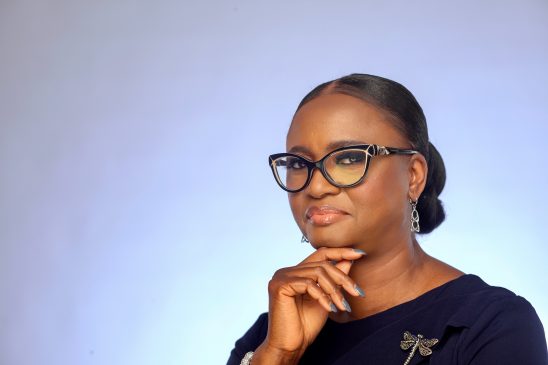
*Elohor Aiboni
The former Managing Director of Nigeria LNG, Mr. Tony Attah at the announcement of the execution of sales and purchase agreements for domestic supply of LNG in June 2021 in Abuja, stated that the gas company has paid about US$18 billion as dividends to the Federal Government of Nigeria.
“Nigeria LNG is respected internationally because of its solid reputation as a responsible, trusted and reliable supplier of LNG.
“At the home front, we are distinguished as a development partner with Nigeria’s Government, with our six-train plant generating more than US$110 billion in revenue since it began operation in 1999.
“Nigeria LNG has paid about US$18 billion as dividends to the Federal Government of Nigeria, through the state-owned Nigerian National Petroleum Corporation (NNPC) 49% shareholding and equivalent amount as dividend to the other three shareholders in the same time period. We have also paid about US$15 billion for feed gas purchases to the Federal Government of Nigeria through its shareholding in NNPC and about USD9 billion in taxes.
“In addition, Nigeria LNG remains a major influencer in the domestic LPG sector. Presently, we have dedicated 450ktpa of LPG to the market and our focus is to support the use of cleaner energy to protect our citizens and the environment from the hazards posed by other cooking fuels by encouraging the use of cooking gas in Nigeria.”
Attah noted that under the execution of sales and purchase agreements, NLNG would supply 1.1 million tonnes per annum (MTPA) of LNG on delivered ex-ship (DES) basis to Asiko Power Limited, Bridport Energy Limited and Gas-Plus Synergy Limited. The SPAs will facilitate the project execution and development of infrastructure led by off-takers to aid LNG delivery into the domestic market, he added.
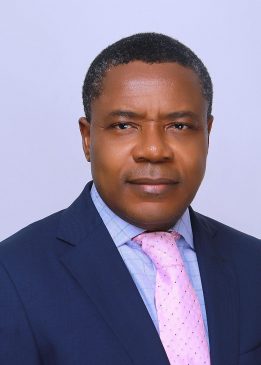
*Ralph Gbobo
It would be recalled that a few years, dividends paid to the Federal Government by Nigeria LNG made headlines because the government then was at its worst lows in terms of revenue generation.
In the power sector, Shell Joint Venture built the Afam VI power plant in Rivers State. The combined cycle gas powered plant began operation in early 2008 with an initial 450 megawatts (MW) electricity supply. By 2018, the power plant was supplying 624MW. At a point, the 650MW installed capacity thermal power plant was supplying about 15 per cent of the total power generation wheeled into Nigeria’s national grid. In addition, besides supplying light to communities in Rivers State, the power plant generated subcontract opportunities and employment for over 150 people from the 16 communities, and also provided hands-on and offshore training for 30 youths in electrical, mechanical and instrumentation engineering on combined cycle power plant operations and maintenance. The trainees are currently working in various capacities in different companies in Nigeria and overseas.
Afam VI uses combined cycle gas turbine technology that burns 40 percent less gas than plants using older open cycle technologies. This also contributes significantly to the reduction of greenhouse gas emissions.
In November 2017, the Nigeria Electricity Regulatory Commission (NERC) renewed SPDC JV’s Afam VI power generation licence for another 10 years, and in December 2017, the company signed an interim multi-year agreement with General Electric to improve the power plant’s availability, reliability and output for up to 200,000 Nigerian homes, while decreasing its operational costs.
The agreement covered planned maintenance for the four turbines and upgrade of the gas turbines to help increase the plant capacity by up to 30MW while increasing its efficiency and significantly saving fuel and reducing carbon dioxide (CO2) emissions.
As a Clean Development Mechanism (CDM) project under the United Nations Executive Board for Climate Change, Afam VI Power Plant targets to eliminate over 500,000 tons of CO2 emissions per year, while also maintaining excellent safety standards.
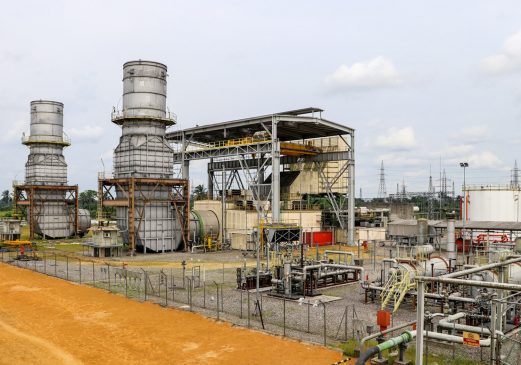
*Afam VI power plant
Afam VI power plant derived its name from Afam village in Oyigbo Local Government Area where it is located. Th plant receives gas from SPDC JV’s gas plant at neighbouring Okoloma village.
Shell pioneered deepwater oil production in Nigeria with Bonga field. The Bonga field was located in Licence block OPL 212 off the Nigerian coast, which was renamed OML 118 in February 2000. The field covers approximately 60 km2 in an average water depth of 1,000 metres (3,300 ft).
The field was discovered in 1996, with government approval for its development given in 2002. The field began first production in November 2005. The field is worked via a floating production, storage and offloading (FPSO) vessel. The field produces both petroleum and natural gas; the petroleum is offloaded to tankers while the gas is piped back to Nigeria where it is exported via an LNG plant. The field contains approximately 6,000 mm barrels of oil.
Located 120 kilometres (75 mi) southwest of the Niger Delta, the first discovery well was spudded in September 1995 after acquiring extensive information about the block via a 3D seismic survey in 1993/94.
A secondary field was discovered in the block in May 2001 known as Bonga SW/Aparo, which encountered significant hydrocarbons. A third field was discovered later in 2004 which is known as Bonga North.
The field has been produced as a subsea tie back to a Floating Production Storage and Offloading vessel (FPSO). Currently there are 16 oil producing and water injection wells on the field. However, this will be increased to nearly 40 wells as the field is developed further. Due to the large size of the Bonga SW it is currently thought it will require separate production facility to adequately produce the field.
Oil produced from the field is stored on the FPSO for transport to markets via tankers while the gas is exported via a pipeline to the Nigerian Coast for LNG.
The FPSO was built by Samsung Heavy industries. It was then taken to Newcastle upon Tyne for installation of the process topsides. It contained a number of firsts for its type, the SURF (Subsea, Umbilical, Risers and Flowlines).
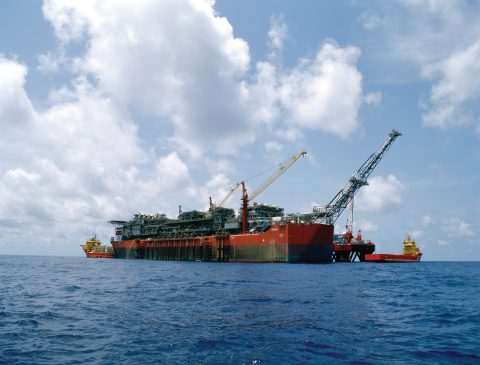
*Bonga FPSO
Social investments
SCiN undertakes two types of social investment activities – Direct social investment across Nigeria and Community-driven development programmes and initiatives in the Niger Delta. Direct social investment focuses on community and enterprise development, education, community health, access-to-energy, road safety and biodiversity, which was added in 2018. Community-driven development programmes and initiatives in the Niger Delta focus on various themes as determined by benefitting communities and delivered through a Global Memorandum of Understanding (GMoU).
Therefore, Shell Companies in Nigeria have identified social investment as key to sustainable development of the Niger Delta region and fast track the economic growth of the country. In line with its corporate social responsibility (CSR), the Group works with government, communities and civil society to implement programmes that have a lasting impact on lives in the Niger Delta and beyond.
To ensure that investments in social development are contracted in a seamless manner, the SPDC JV since 2006 has delivered the majority of its social investment projects through the Global Memorandum of Understanding, GMoU model. According to Shell, “This seeks to increase transparency and accountability around project delivery and give communities greater ownership of projects from their inception.”
It further said: “Social investment activities are focused in particular on community and enterprise development, education and health,” and have, therefore, outlined a number of programmes in this regard.
For instance, launched in Nigeria in 2003, the LiveWIRE is Shell’s flagship youth enterprise development programme. It provides access to training, business development services and start-up capital. To date, the programme has trained more than 8,000 Niger Delta youths in enterprise development and management, of whom more than 3,000 have been provided with business start-up grants.”
In 2014, the scheme was broadened to include a specific focus on people with physical impairments; over 200 disabled people had already benefited from training and grants by the end of the year.”
LiveWIRE was also extended into Ogoniland in 2014, with the objective of raising living standards and reducing crude oil theft through the promotion of alternative livelihoods. The first trainees graduated in February 2015.
In addition, the Group has also initiated a ‘Cradle to Career’ programme through which it pays for children from rural communities in the Niger Delta to attend some of the country’s top secondary schools. About 120 students received scholarships under the programme in 2014, bringing the total number of beneficiaries to 360 since the scheme was launched in 2010.
SCiN, also, focuses on building capacity in key technical skills, for example donating equipment to universities to develop capability in the production of drilling mud. Ten graduate scholarships are also awarded annually to students from Rivers, Bayelsa and Delta States to study engineering and geosciences at top universities overseas, building a talent pipeline within host communities.
In 2022, the SPDC JV, SNEPCo and SNG invested $5.6 million in education programmes. More than 3,000 secondary school grants, 3,500 university grants and 990 cradle-to-career scholarship grants have been awarded since 2016. Also, 17 health-care projects were supported by the SPDC JV and SNEPCo.
The SPDC JV, SNEPCo and SNG also contributed $34.29 million in direct social investment. Social investment was mainly in projects related to community, health, education, road safety and enterprise programmes. These projects are often implemented in partnership with local authorities.
Other social investments include the Health-in-Motion mobile community health outreach programme, which takes free medical services to where people live and work, has benefitted more than one million people since its launch in 2010. Funded by SPDC and SNEPCo, the programme assisted a further 12,755 people in 2022.
*In 2022, SNEPCo constructed and renovated two primary healthcare centres for Internally Displaced Persons (IDPs) in Borno and Yobe states in north-east Nigeria. These provide Water, Sanitation and Hygiene (WASH) facilities, medical infrastructure and training for 252 healthcare workers.
*The number of people enrolled in the Community Health Insurance Scheme (CHIS) increased by 7,149 in 2022.
*More than 92,000 people have benefitted from CHIS since its launch in 2010. The scheme, which covers primary and secondary care services, is a partnership between SPDC, the Rivers state government and local communities.
*The Obio Cottage Hospital is a specialist maternal and child health hospital. It has specialist pre- and post-natal wards, an operating theatre and provides other services. In 2022, 3,243 babies were safely delivered, making a total of more than 37,000 safe births at the hospital since 2010. The hospital is funded by the Community Health Insurance Scheme (CHIS).
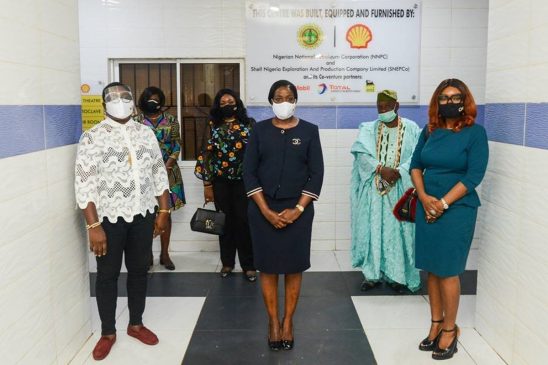 *
*
Shell delivered the final phase of the Oloibiri Health Programme (OHP), which incorporates a health campus and an access road, a hybrid solar-powered electrification system, a zonal drug distribution centre, community water supply, and an infant care programme.
The OHP is a Shell-funded local government initiative in the Ogbia area of Bayelsa state. Since its launch in January 2019, cumulatively more than 18,000 patients have been seen in the two OHP health facilities (Kolo General Hospital and Oloibiri campus). Also, SCiN have a long history of supporting education through scholarships and other initiatives. Since the 1950s, the Shell scholarship schemes have supported several thousands of students, many of whom have gone on to become Nigeria’s business, political and social leaders.
*SNEPCo constructed, furnished and delivered a 100-seat ICT Centre, at the Federal University of Petroleum Resources Effurun (FUPRE), Delta state in 2022.
*SNEPCo continued the construction of two educational infrastructure projects valued at $15 million:
*A $10 million Geosciences Centre of Excellence for the University of Lagos, and
*A $5 million e-library project for the Niger Delta University, Bayelsa state.
Local content development
Shell actually pioneered local content in Nigeria. It has contributed greatly to the development of indigenous capacities in the oil and gas industry. The big indigenous oil service companies and independents in Nigeria’s upstream petroleum industry attest to the fact that Shell was the first oil major to give them a chance to show their capacities and capabilities.
Weafri Global Well Services Limited is one of the oldest and biggest oil service companies in Nigeria. In an encounter with our reporter in Texas, United States, the Executive Director of the company, Mr. Chris Onyekwere, laid bare how Shell began to empower Nigerian firms by giving them opportunity to do jobs for it. This, according to him, was when services to exploration and production (E&P) firms in Nigeria especially the international oil companies (IOCs) was seen as exclusive preserve of the international oil service companies.
To him, he will be eternally grateful to Shell because the oil giant took the risk to give indigenous Nigerian oil service companies opportunity to work on its facilities.
Onyekwere said: “Our experience from 1988 to where we are today is largely credited to Shell. Shell was the company that first gave us opportunity to demonstrate we can do their cementing job and will not junk their well. They had that confidence in us. Another company is the NPDC. We don’t forget such people. Although I have not been around in Nigeria for some time but I’m up to date on all the daily activities in Nigeria.
“If we look at the history of Shell, we must be grateful to them. Shell understood that it was time to give back. They were the first to start production in Nigeria in Oloibiri. They backed the first generation that started the growth of indigenous operators and service providers. They understood it was time to give Nigerians opportunity and that was when they started getting more Nigerian managers in Shell. That is a development we often underrate. The truth is that if you don’t incorporate people that understand your problems anywhere you work, the problems persist. If you don’t understand my problem you cannot solve it.
“So when Shell started incorporating people that have been in that situation and understood the problems into their system as managers, they started giving indigenous players a trial. These indigenous players had experience where they worked in the past, they have done it in the past, they can do the job. They took that risk assessment and allowed the risk and gave us that opportunity. I have to commend them.
“Secondly, when the Nigerian Oil and Gas Industry Content Development (NOGICD) Act was enacted and the pressure was on the IOCs (major oil service companies) that service the industry of losing their grip, they turned back to sabotage us by campaigning that we may not be able to deliver the jobs as our fellow competitors. As if that was not enough for them, in 2012 just two years after the enactment of local content law, what they did was clog into our system, poached all our supervisors just to cripple and render us handicapped but they didn’t know we would remain competitive as their competitors.
“As they continued poaching, we continued training more personnel. So we had more than enough manpower to the point that if we didn’t them in-country, we export them. We approached the IOCs and made a presentation as PETAN to them. We said we would do a practical training, let them sponsor for one year any candidate from the university and we do the training, so that we churn out more people. Shell accepted as we made that presentation. So, Weafri started the practical training with other companies participating but still under Shell. So Shell gave the candidates one year training while we gave them the practical training. That training has been ongoing but I don’t know whether it is still sustainable as at this time.
“From there, the Nigerian Content Development Board (NCDMB) has started the same thing too. I’m giving you the genesis of this practical training. Presently, WEAFRI is training for NCDMB, Agip and for Shell, that is the one year programme and I want that training to continue and we need to promote it. The media can help in this regard. We at WEAFRI has not gotten anything as regards that training from Shell since last year to date.
Today, WEAFRI has offices and operates in United States, Kuwait and South Korea.
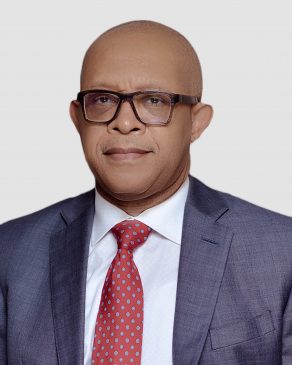
*Okwuosa
Also, Oilserv Group, which currently is Nigeria’s leading oil service company, playing effectively and prominently in engineering, procurement, construction, installation (EPCI) and commissioning with testimonials from its numerous clients including IOCs and Independents for its competence.
Oilserv have handled major gas projects including the OB3 and the ongoing AKK project, among others. Oilserv Group Chief Executive Officer, Engr. Emeka Okwuosa, said the company was established in 1992, and has currently developed into a conglomerate with five subsidiaries – Frazimex Engineering Limited, FrazPower Limited, FrazOil Limited, Ekcel Farms Limited and Crown Energy Limited, strongly playing in various sectors of the economy, thus making the Company a unique integrated firm, a major player in the sector and a reference point for its contemporaries.
Engr Okwuosa said he worked for Schlumberger worldwide, and returned to Nigeria in 1994. Having incorporated Oilserv Limited in 1992, the company began operation in 1995.
“On commencement of operations in 1995, the company worked exclusively for Shell for the next five years, after which it started working for other International Oil Companies (IOCs) and the Nigerian Liquefied Natural Gas (N LNG) in maintaining their pipeline transmission systems,” he added.
In the upstream sector, divestment of Shell’s onshore and shallow water fields gave rise to the current indigenous independents that have become names to reckon with – the likes of Seplat Energy Plc and Aiteo, among others.
Shell divested its stakes in oil mining leases (OMLs) 4, 18, 24, 25, 29 38, and 41 – as well as a major pipeline, the Nembe Creek Trunk Line, which were all taken up by Nigerian companies. These divestments created the leading independents such as Seplat Energy Plc and Aiteo Exploration and Production, among others.
Shell contributions to Nigeria’s economy
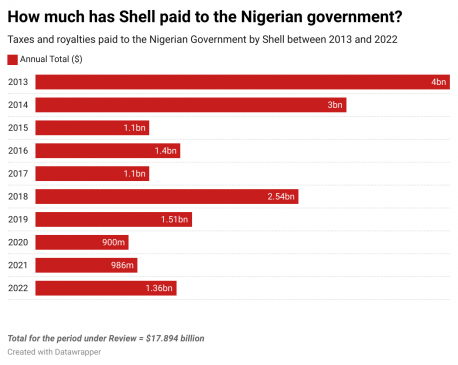
Shell Companies in Nigeria have contributed immensely to the growth and sustainability of the Nigerian economy. Findings by The Business Intelligence Africa (TBI Africa) magazine show that in the past nine years between 2014 and 2022, Shell Companies in Nigeria (SCiN) has paid the Nigerian government a total of US$39.718 billion as production entitlements, taxes, royalties and fees. A breakdown shows that in 2014, it paid $3.02 billion; 2015 ($4.95 billion); 2016 ($3.64 billion); 2017 ($4.32 billion); 2018 ($6.397 billion); 2019 ($5.63 billion); 2020 ($3.24 billion); 2021 ($4.00 billion) and in 2022 ($4.521 billion).
Also, taxes and royalties paid to Nigerian Government by Shell Petroleum Development Company Limited (SPDC) and Shell Nigeria Exploration and Production Company (SNEPCo) in the past 10 years between 2013 and 2022, according to TBI Africa research was a princely US$17.894 billion.
In 2013 SPDC and SNEPCo paid $4bn in the ratio of (SPDC $2.6bn) and (SNEPCo $1.4bn), in 2014 $3bn (SPDC $1.8bn) and (SNEPCo $1.2bn), in 2015 $1.1bn (SPDC $0.6bn) and (SNEPCo $0.5bn), in 2016 $1.4bn (SPDC $1bn) and (SNEPCo $0.4bn), in 2017 $1.1bn (SPDC $0.4bn) and (SNEPCo $0.7bn), in 2018 2.539bn; in 2019 $1.509bn; in 2020 $0.9bn (SPDC $0.4bn) and (SNEPCo $0.5bn), in 2021 $0.986bn (SPDC $0.424bn) and (SNEPCo $0.562bn), in 2022 $1.36bn (SPDC $0.450bn) and (SNEPCo $0.907bn). Therefore, the total payments in taxes and royalties to Nigerian government in the past 10 years were US$17.894 billion.
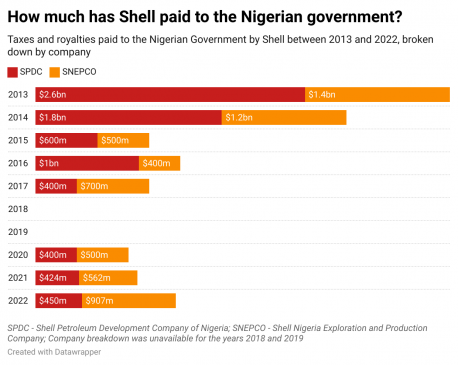
In 2019, SPDC made significant progress with new gas production from two large projects: Southern Swamp and Forcados Yokri. Gas from the Southern Swamp is intended for export as LNG, providing revenue to the government and opportunities for expansion.
Gas from Forcados is expected to be sent to the domestic Nigerian market to provide clean reliable power for more than 100 industrial and commercial customers through Shell Nigeria Gas Limited. Customers include a large float glass manufacturer, a pharmaceutical factory as well as large commercial market zones and local and international consumer goods companies.
SPDC has taken big strides in building what is expected to be the largest gas facility in the country at the Assa North-Ohaji South project. When completed, the processed gas is expected to further boost gas supplies to industrial and commercial customers in Nigeria and boost economic prosperity for the growing population.
SPDC worked with around 286 Nigerian companies and about 3,000 Nigerians to deliver the Southern Swamp Associated Gas Solution project. The contracted companies provided services including building processing facilities, laying pipelines and providing commercial offshore divers.
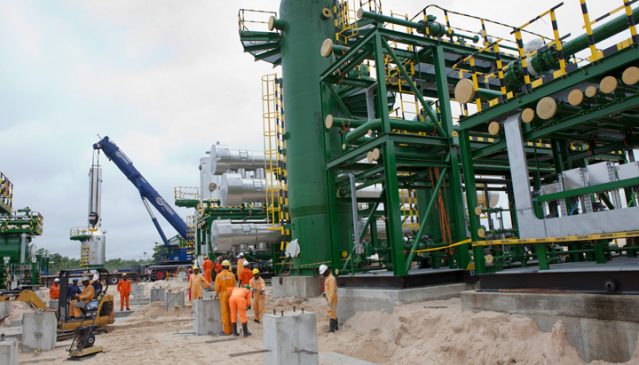
*Tunu gas gathering facility
Tackling plastic waste
In 2019, Shell Companies in Nigeria announced plans to reduce single-use plastic at facilities by at least 50% by 2020. They began by introducing alternatives such as water refill stations and reusable water bottles. Some sites made significant progress, including the Gbaran-Ubie facility that reduced single-use plastic by 90% in 2019, a drop from around 10,000 1.5 litre bottles a month to 1,000.
In 2020, Shell companies awarded contracts worth more than $0.8 billion to Nigerian-registered businesses and contributed $49.4 million in social investment projects, mainly in enterprise support, education, health care and road safety. $18.6 of this spend was made on COVID-19-related interventions.
Shell has interests in several companies in Nigeria that produce and distribute oil, gas and other energy products. This energy contributes to economic growth in the Niger Delta and across the country. The businesses in which Shell has interests employ 2,700 people directly and provide jobs for many others in supplier networks.
Shell companies in Nigeria also contribute to community health, education and enterprise programmes, supporting the development of Nigerians and indigenous companies. In 2020, Shell launched measures to help protect employees from the COVID-19 virus and made additional contributions to communities. This work included setting up food programmes at seven COVID-19 isolation sites and providing testing kits, medical equipment, sanitiser and personal protective equipment to nine states.
The Nigerian government aims to power economic growth by focusing on developing oil and gas resources, investments in infrastructure and expanding access to energy for Nigerians.
SPDC is also building facilities to gather gas that would otherwise be flared. Since 2002, SPDC’s flaring in Nigeria has been reduced by 90%. Gas that was once flared is now captured and processed to supply domestic and international gas markets.
An example of this gas-gathering work is the Southern Swamp Associated Gas Solutions project, which was commissioned in 2020. SPDC is planning to reduce associated gas flaring further through its Forcados Yokri gas-gathering project, a significant part of which is expected to be completed in 2021.
2022 briefing notes
The 2022 Nigeria briefing notes gave insights into the activities of SCiN, the operational challenges, milestones achieved and future plans.
In his highlights of 2022 activities, the Managing Director of the Shell Petroleum Development Company and Country Chair of Shell Companies in Nigeria, Mr. Osagie Okunbor, said: “Despite production challenges in 2022, the tenacity, commitment and resilience of our people enabled us to deliver some significant achievements and continue to power progress in Nigeria.
“Each year, the Nigeria Briefing Notes reflect our pride in the work of Shell Companies in Nigeria, the progress that we have achieved and the contributions we have once again made to communities.
“For our businesses in Nigeria, 2022 was very much a year of two halves, with the first half proving especially difficult due to the production challenges outlined in these pages. Tragically, 2022 was also a year where our country experienced its worst flooding in recent history, with many lives lost and hundreds of thousands of people displaced from their homes.
“However, despite these headwinds, the tenacity, commitment and resilience of our people allowed us to turn a corner on several fronts, leading to optimism for the beginning of 2023.
Crude theft is a serious threat to our country
“Last year, we faced our biggest operational challenge in many years at SPDC, where a significant decline in crude receipts at the Bonny Oil and Gas Terminal resulted in our declaration of force majeure in March 2022. I am pleased to say that the force majeure on the Bonny export programme was lifted in March 2023.
“Unfortunately, along with other operators in Nigeria, SPDC continues to face the twin challenges of sabotage and crude oil theft, each of which not only deprives our country and our people of billions of dollars of tax revenue, but also endangers people’s lives. Sadly, we were reminded of these dangers in March 2023 when a fire incident occurred at the site of an illegal connection used for crude theft on the Rumuekpe – Nkpoku trunk line in Rivers state. The line was not operational at the time of the fatal incident.
“Crude theft poses a serious environmental risk that impacts not just oil and gas operations but also our communities. Our teams continue to collaborate with the Nigerian government and other stakeholders with the aim of eradicating crude theft from our facilities. There is cause for optimism, as these collaborations are starting to yield results through changes in approach. Together, we have also made progress in developing security systems that allow us to better monitor our facilities, and therefore detect and deter some of these illegal actions.”
Recall that Okunbor at a conference in Abuja said that Shell loses 44 per cent of oil it pumps into the Trans Niger Pipeline (TNP) before it gets to the terminal.
“I can tell you that our most important pipeline in the Delta – the Trans Niger Pipeline (TNP) and the reconciliation factor, which is the difference between what you put into the pipe and what arrives at the terminal, the reconciliation factor is around 56 per cent, which means 44 per cent of what goes into that pipeline disappears.
“This is material not just for Shell but it is even more material for the country. As you know, 90 per cent or more of oil that is produced in JV goes back to this country either via taxes or royalties, among others. I’m talking about the net after cost, so this country bleeds a bit.”
Okunbor noted that the SNEPCo team, most of whom he was proud to say are Nigerians, delivered an outstanding milestone early in 2023. The Bonga FPSO, the country’s first deep-water exploration and production vessel, exported its one billionth barrel of oil – a fantastic achievement.
“In 2022 our country was profoundly impacted by severe flooding, which affected businesses and communities in several states. Shell responded by committing $1 million to support the government’s efforts to provide relief. Beyond that, our own staff raised more than 10 million Nigerian Naira for people most in need.
“Our commitment to Nigeria is not simply in response to such challenges, and in the factsheet of this report, you will find a summary of the revenue we generated for the government through taxes, the employment opportunities we created and the contributions we have made to developing local businesses.
“Between them, SPDC, SNEPCo and SNG spent $34.29 million in direct social investment during 2022. A further $56.13 million has been earmarked to be paid in 2023 by SPDC and SNEPCo as a statutory contribution to the Host Communities Development Trusts (HCDT) which will benefit our communities.
“While these HCDTs are one valuable outcome of the Petroleum Industry Act (PIA), we have always demonstrated resolute commitment to our communities, and we will continue to do so.
“In 2022, we worked on several projects including the completion of the final phase of our Oloibiri Health Programme in Bayelsa state which has helped over 18,000 patients since its launch. The integrated healthcare project, powered by a hybrid solar electrification system, provides access to a health campus, drug distribution centre and an infant care programme.
“I am similarly proud of the incredible work that we do to support entrepreneurship and education. SPDC, SNEPCo and SNG funded more than $5.6 million in academic scholarships in 2022, investments that are critical to the country’s development. Many of these programmes’ previous beneficiaries have gone on to become today’s business and political leaders in Nigeria. In tandem, we continue to improve opportunities for young Nigerians to achieve their ambitions through the Shell LiveWIRE youth programme, providing training in enterprise development and management, as well as business start-up grants.
“All On – the impact investment company we established in 2016 – continues to go from strength to strength, backed by $200 million of seed funding provided by Shell. By the end of 2022, All On had committed a total of $23.6 million to a portfolio of 46 renewable energy companies. By doing so, it is increasing access to commercial renewable energy products and services for the under-served, and indeed the completely unserved off-grid energy markets, with a special focus on those in the Niger Delta.
“We are inspired by the possibilities that exist for developing new gas distribution solutions. SNG continues to provide gas to both business and domestic customers in Nigeria. Meanwhile, Shell’s acquisition in December 2022 of Daystar Power, an integrated solar power provider in West Africa, is well aligned with our strategy of delivering more and cleaner energy.
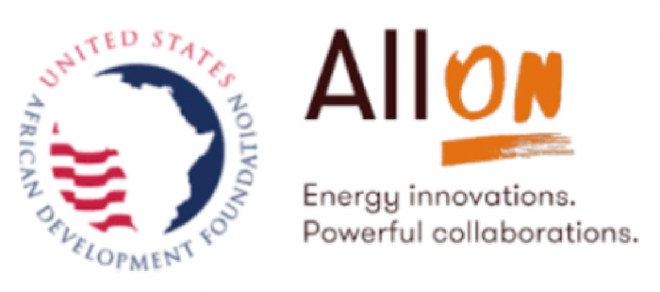
“SPDC also took further actions on existing gas projects, such as drilling additional wells to restore supply capacity to meet its commitment to NLNG and build additional contingency margin. Additional projects are planned for 2023 to build further resilience in supply capacity.
“I am also pleased that once again Shell Companies in Nigeria and our staff have been recognised with a number of awards during 2022. To name just three, we have received accolades as Best International Company of the Year (Petroleum Technology Association of Nigeria), Upstream Company of the Year (Nigeria International Energy Summit) and Leading Tax Compliant Firm in Nigeria (Federal Inland Revenue Service).
“Shell Companies in Nigeria have significantly contributed to Nigeria’s economy and its communities for over six decades. We believe strongly in the talents, capacity and culture of the Nigerian people. Going forward we will continue that collaboration, working together to power progress in Nigeria.
“Shell Companies in Nigeria (SCiN) contribute to economic growth in Nigeria by generating revenue for the government through taxes, creating employment opportunities and contributing to the development of local businesses.
*$1.36 billion⁴ in corporate taxes and royalties paid to the Federal Government of Nigeria (SPDC $450 million and SNEPCo $907 million), compared with $986 million in 2021.
*SPDC, SNEPCo and SNG awarded $1.9 billion contracts to Nigerian-registered companies. Overall, there has been a 138% increase in SCiN’s total value of contracts awarded in 2022 compared to 2021.
*SPDC, in compliance with statutory requirements, paid $59.04 million⁴ in 2022 to the Niger Delta Development Commission (NDDC). SNEPCo and its partners in compliance with statutory requirements paid $20.73 million to NDDC in 2022.
*SCiN directly employed more than 2,500 people (of whom 97% are Nigerian nationals) with 10,000 contractors supporting operations.
Shell has invested in game-changing businesses in Nigeria for over 60 years and in 2022 we continued to power progress, impacting lives and unlocking opportunities.
*Combined production by SPDC and SNEPCo (Bonga) was 478,940 barrels of oil equivalent per day in 2022. This is a reduction compared with 493,000 barrels of oil equivalent per day in 2021. The decline was largely the result of a partial shutdown of production for around six months due to an unprecedented increase in crude oil theft activities along the Trans Niger Pipeline (TNP).
*SPDC lifted the force majeure on its Bonny export programme with effect from March 15, 2023. The declaration of force majeure on March 3 2022, was on account of significantly lower deliveries of crude oil to the Bonny Terminal because of theft from illegal connections to pipelines.
*In February 2023, the Bonga FPSO, the country’s first deep-water exploration and production vessel, exported its one billionth barrel of oil.
*SPDC successfully delivered first gas from the Enwhe East and KoloCreek to Soku Wells projects in 2022, adding about 350 mmscf/d of additional gas capacity.
*Following the expiration of OML 11 in 2019 and the subsequent non-renewal of the lease by the Federal Government of Nigeria, SPDC completed the handover of the lease and operatorship in 2022.
*SNG signed an agreement with the Oyo state government, in the south-west of Nigeria, to build a gas distribution infrastructure network with the intention of delivering gas to industries and other large-scale commercial businesses within the state and beyond.
*Shell acquired Daystar Power Group (Daystar Power), a provider of integrated solar power to commercial and industrial businesses across West Africa in December 2022. Daystar Power has around 250 projects across West Africa with approximately 40 megawatts of solar installation and plans to rapidly grow and expand into other markets.
*NLNG Train 7 offsite piping prefabrication work is in progress. In addition, construction activities on the workers’ camps, marine scopes and brownfield tie-ins have ramped up.
*At the end of 2022, All On’s total portfolio of renewable, energy access investee companies increased to 46, with a total of $23.6 million in investments committed to be paid. In addition, the All On Hub increased its supported businesses from 41 to 91 ventures. Since its inception in 2017, All On has delivered more than 75,000 energy connections⁵ through its investee companies.
*In 2021, Shell plc announced its intention to reduce its involvement in onshore oil production in Nigeria while remaining in deep-water and its integrated gas position in country.
“We will continue to clean up oil spills, despite the challenges arising from the illegal actions of third parties, such as sabotage and crude oil theft. The clean-up and remediation in the Ogoniland community of Bodo is expected to be completed by the end of the third quarter of 2023, with around 87% of the area having been remediated during 2022 and close to 340,000 mangrove seedlings now planted. We remain committed to supporting the clean-up efforts led by the Nigerian government’s Hydrocarbon Pollution and Remediation Project (HYPREP) which was established following the United Nations Environment Programme’s 2011 report,” Shell stated.
Commendations from external stakeholders
De-Rabacon Plastics is a Nigeria-based plastic recycling and waste management solution company that recycles end-consumer plastics into viable commercial products such as pavement blocks, buckets, cans and carpets. The company won the maiden Shell Top Ten Innovators Award’s Outstanding Achievement Award in 2018.
“There is often a paper-thin line between success and failure in business, especially for a start-up. The training, support systems and valuable networks I have gained over the last 5 years, courtesy of Shell LiveWIRE, have gone a long way to ensure that my business start-up, De-Rabacon Plastics, is thriving.
“Shell’s approach on supporting local enterprises to grow and excel is enabling us to scale up our business and focus on designing eco-friendly, energy-efficient and affordable products. Today my organisation employs 16 people and has recycled over 800,000 tonnes of plastic waste. We plan to achieve two million tonnes by the end of 2020,” said Yolo Bakumor Smith, CEO, De-Rabacon Plastics.

*Ojeme Ewhrudjakpor
“The collaboration between the Federal Road Safety Corps (FRSC) and SPDC is the key to achieving the goals of the United Nations Decade of Action for Road Safety in Nigeria. The National Community Post Crash Care Initiative (NCPCCI), has 27 centres in 13 states with 540 volunteers. These initiatives and the crash care efforts recorded have led to its adoption by the West African Road Safety Organisation to be replicated in other West African countries.
“SPDC has also helped the FRSC by supporting the use of speed radar devices, breathalysers and extricating equipment. The annual National Road Safety Quiz for senior secondary school students, the marathon race and support for crash victim remembrance day have also helped promote awareness of road safety. The FRSC appreciates the expansion of the NCPCCI to cover all the critical road corridors in Nigeria, in addition to sponsoring campaigns for safe tyres and the installation of speed-limiting devices,” said Ojeme Ewhrudjakpor fdc, former Deputy Corps Marshal (Operations), Federal Road Safety Commission, Abuja, Nigeria.




